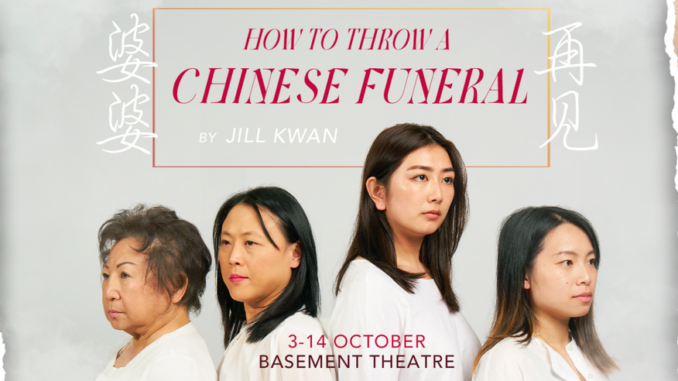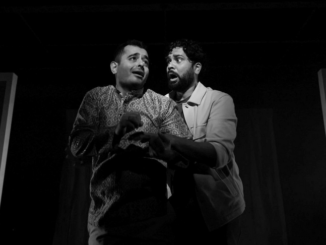
Kenangan Wangi (Sweet Reminiscence)
Alamak! It’s such a treat to hear authentic Manglish at The Basement Theatre. For the uninitiated, Manglish is the ‘rojak’ (fruit salad) combination of English-Malay-Cantonese-Hokkien-Hindi-Tamil words that typically pepper everyday Malaysian conversations. And How to Throw a Chinese Funeral’s dialogue epitomises this Malaysian vernacular down to its core. The play captures a familiar slice of Malaysian life featuring over the top caricatures of the disapproving martyr-like parent and auntie who are juxtaposed against their Western-wannabe offspring.
Playmarket’s 2021 Asian Ink winner and 2022 Adam NZ Play Award finalist, playwright Jill Kwan skilfully demonstrates her ability to capture the essence and dynamics of a typical Malaysian-Chinese family. The take-no-prisoners language and attitude of the lead characters are incredibly nostalgic for the Malaysians in the audience.
The first half of the play is indeed a joy to watch as it ebbs and flows telling the tale of Lily (Lisa Zhang) and Anna’s (Ann An) grandmother’s passing, culminating in an unplanned reunion that focuses on orchestrating her Taoist funeral. Their sisterly ‘love’ is displayed through constant bickering which is incredibly believable. And the trials and tribulations that life hurls at them, provide us insights into their complex journey to redemption.
The younger family members are led by their headstrong devout Christian mum Mei (Yoong Ru Heng) and their outrageous Auntie Yi (Janet Tan), the matriarchs are adamant to keep the vestiges of their traditions alive despite old tensions and new revelations challenging everything they hold true.
The story, which centres around three generations of Malaysian-Chinese women, can only be described as enigmatic and mysterious leaving those behind to untangle, confront and resolve deep-seated generational issues ultimately reach a tipping point.
But it is the ability to recreate the complex dynamics of intergenerational misunderstanding and perhaps even deceit, tinged with an unique Malaysian flavour, that gives this production its edge.
The predominantly female cast shines throughout the production with Tan often stealing the show. As the long-suffering, raw, and more traditional daughter of the deceased character she delivers a majority of the humour, through the stellar lines that she is gifted, which she dishes out with great aplomb. Conversely Charles Chan’s Monk character provides the voice of reason. He is the family’s solid, almost silent and consistent grounding force amidst family squabbling, which simultaneously manages to inject tongue-in-cheek religious intolerance that provides a lighter counterbalance to the sombre proceedings.
While the mysterious old man Lishanth, expertly played by Mustaq Missouri, adds a sense of intrigue and mystery to the narrative, we can’t help wanting more to understand this subplot and backstory. A bigger reveal seems anticipated by the crowd but we were sadly disappointed as that plot line is never fully resolved.
In terms of pacing there was a crackerjack start with the key characters congregating for the funeral and reigniting old relationships and rivalries. Between that and the many necessary resolutions of relationships and rivalries towards the end, there is a slight mismatch between the trade-off of drama and brevity. An anomaly that can be easily addressed. In an abrupt change of style in the second half of the play, we are exposed to a series of vignettes rather than smooth transitional scenes, which coincidentally mirror the staccato onomatopoeic pattern of the Malaysian accent.
Kwan’s decision to self-direct their own play is a brave decision, which triumphs at times but occasionally falls down possibly due to the lack of self-censorship, in terms of what to retain and what to discard to benefit the production’s flow.
Projection Puppeteer Yin-Chi Lee, alongside Puppeteer (and puppet designer) Darryl Chin, create a fabulous element of the production reminiscent of Wayang Kulit, which engages the audience and is an integral part of growing up in Malaysia.
Composer Fiona Chua’s sound scape was absolutely stunning throughout, giving the cultural context and adding yet another textural layer to the production. In addition Rae Longshaw-Park’s lighting and scent design, and Talia Pua’s set design provide a perfect complement to the narrative taking place in the foreground.
While we believe that How to Throw a Chinese Funeral is lovingly, beautifully crafted and produced it is a fact that it could prove challenging for someone who has yet to encounter quintessential Malaysia-ness. However, take our word for it – ultimately the payoff is well worth it.
FULL DISCLOSURE FROM SHARU DELILKAN:
Being of Malaysian descent I realise that I have a biased slant on loving the cultural flavour that I haven’t experienced for yonks.
How to Throw A Chinese Funeral plays Basement Theatre 3rd to the 14th of October 2023.




Leave a Reply